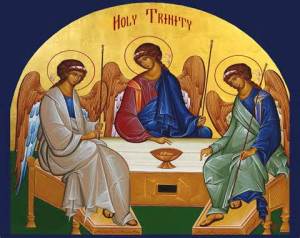Superstition and the Sacraments
by nonewsisnew
The above link goes to an article about a man who is denied a sacrament. At first pass this seems outrageous, but by recognizing what a sacrament is we can see the particulars of this case actually make a lot of sense.
The purpose of all 7 Sacraments is to bring us into relationship with God. Baptism starts and Confirmation completes the founding of our friendship. Eucharist is the celebration and renewal of that communion. Holy Orders and Marriage both guide us into a deeper frienship with God by teaching us to how to serve each other. Reconciliation and the Anointing of the Sick heal us when we have damaged that relationship or are close to death and so want to ensure our relationship is strong.
The sacraments are not magical because they go hand in hand with our union with God. For example: if I was not yet baptised when I died, but I desired a relationship with God, then I can be assumed to have a “Baptism of Desire” and (even without a baptism of water) I might be with God celebrating that connection in Heaven. To think the sacraments are efficacious without an internal aspect of faith is to fall into superstition. As the Catechism says, “To attribute the efficacy of prayers or of sacramental signs to their mere external performance, apart form the interior dispositions that they demand, is to fall into superstition” (CCC 2111).
Looking at the particulars of the case in the article, there was a man who was apparently unrepentant about being in a sexual relationship with another man. Briefly put, this sort of relationship leads us away from the truth of God by lying about his nature. Since the man didn’t want to repent from lying about the nature of God with his actions, the performance of the sacrament of Anointing of the Sick would have been mere superstition.
Here we must go down a brief rabbit hole without losing focus about the topic at hand. Marriage is a picture of God’s love. The Father and Son have such a real love that it (because of the nature of that love) is personified into the Holy Spirit. The nature of male-male or female-female love is such that it cannot generate new persons. The nature of male-female love is such that it can generate persons similar to the out-flowing of the Holy Spirit, and so female-male love is an icon of God.
Sex therefore becomes an image to us of who God is. If we use sex in such a way that it doesn’t properly show us who God is, then we misuse it. It is no coincidence that people commonly yet out “Oh God” during sex. This topic deserves more digital ink, but let this suffice as a summary so we can get back to the topic at hand.
The man in the article is by his actions rejecting God, but yet wants a sacrament so he can have union with God. He doesn’t want “to rot in hell”, but he also doesn’t want to live a celibate life in communion with God. The priest “can’t give you [Communion] if you continue that lifestyle, if you’re an active participant” because by participating in that lifestyle one is choosing to reject God, which is the opposite of Communion. If the man had same sex attraction but still sought out God and tried to live with good will towards God, then I would agree that, “who am I to judge” such a life?
Sadly, this article doesn’t discuss such a man, a man living a celibate life not by desire for such a life but rather out of love for God. Instead it discusses a man living out his carnal desires to the point of rejecting God and the shepherding actions of a priest. In his desire to not “end up 63 and alone”, he has decided to reject the Church, to reject Jesus, and hence to be 63 and alone from God. It’s very tragic not that he was denied a sacrament, but that he didn’t want to order his life in such a way as to be ready to receive the sacrament.
Still, it is better to be him than it is to be me. Who knows what I am doing that should prohibit me from receiving the Eucharist? If only a priest would shepherd me as this priest tried to shepherd him, then I might be more on track with life. This man with same sex attraction now can correct his life and be with God for eternity. Me? I might never root out all the sins I am unaware I commit.

